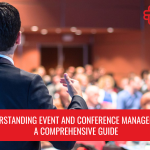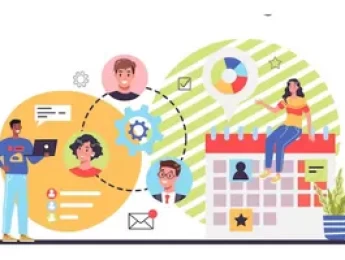As the demand for memorable and impactful events continues to rise, the significance of impeccable organisation and communication skills is absolutely essential. Whether planning a corporate conference, a music festival, or a community gathering, coordinating various elements seamlessly is important for any organisation’s business growth strategy.
This course will focus on honing your organisational, communication, and sales skills. It will ensure that you are well-equipped to handle the intricate details that contribute to the success of any event and will allow you to generate leads, manage a team, and reach out to the right audience.
In the fast-paced realm of event management, adaptability is key. We’ll also examine the need to be flexible in the face of unforeseen challenges, allowing you to navigate the complexities that often arise in event planning. We will explore strategies for effective problem-solving and contingency planning to ensure that you are well-prepared for any curveball that may come your way and understand the benefits and challenges of event management technology.
We will delve into emerging trends and technologies shaping the future of event management, providing you with the insights and skills needed to lead in a constantly evolving landscape. From digital innovations, and risk areas regarding space or funding, to sustainability considerations, we will explore how staying abreast of trends can elevate your events to achieve business growth.
Upon completion of this course, participants will be able to:
- Enhance planning effectiveness, begin by categorising the various types of events and conferences.
- Ensure efficiency, arrange, evaluate, and inspire diverse event and conference management committees.
- Achieve successful promotion by developing a step-by-step promotional plan when planning and publicising events and conferences.
- Comprehend the diverse roles in event management and explain the various functions of organising conferences.
- Maintain financial control, meticulously prepare and oversee the financial aspects of conference hosting.
- Coordinate exhibitions successfully, carefully strategise and execute plans for different types of exhibitions.
- Assess event performance comprehensively and scrutinise all activities to conduct evaluations and follow-up procedures post-event.
This course is designed for anyone responsible for managing or advertising events or conferences in a corporate or charity setting. It would be most beneficial for:
- Events Managers
- Marketing Managers
- Supervisors
- Advertisers
- Public Relations Professionals
- Social Media Managers
- Health & Safety Assessors
- Venue Managers
- Venue Decorators
- Funding Managers
This course uses a variety of adult learning styles to aid full understanding and comprehension. Participants will discuss various types of events or conferences and their differing requirements. They will also review a video based on event safety and understand the legal obligations that an events planner must consider before planning a large event.
The participants will then create a project plan in groups, highlighting risk areas and mitigation techniques to ensure a successful, large-scale event.
Day 5 of each course is reserved for a Q&A session, which may occur off-site. For 10-day courses, this also applies to day 10
Section 1: Planning Events
- Event planning fundamentals.
- Venue selection and negotiation.
- Event logistics and operations.
- Sustainable event planning practices.
- Legal and regulatory considerations in event planning.
- Trends and innovations in the event planning industry.
Section 2: Event Organisation
- Vendor management and contract negotiation.
- Marketing and promotion strategies for events.
- Creative event design and theming.
- Virtual and hybrid event planning.
Section 3: Activities Management
- Networking and professional development for event planners.
- Creating and managing event activity budgets.
- Planning and coordinating diverse event activities.
- Securing and optimising event activity venues.
Section 4: Health & Safety Considerations for Events
- Event risk management and contingency planning.
- Cultural sensitivity in event planning.
- Crisis management in event planning.
- Environmental health considerations for events.
- Continuous improvement in event safety practices.
- Industry standards and best practices in event safety.
Section 5: Emerging Technologies in Events Management
- Technology integration in event planning.
- Augmented Reality (AR) and Virtual Reality (VR) applications.
- Utilising Artificial Intelligence (AI) in event planning.
- Blockchain technology for secure event transactions.
- Internet of Things (IoT) in event logistics and operations.
- 5G technology and its impact on event communication.
- RFID and NFC technology for efficient access control.
Section 6: Managing an Events Team
- Team leadership and communication in event planning
- Client relationship management in event planning.
- Training and professional development for event staff.
- Time and task management in event team coordination.
- Conflict resolution and team dynamics in event settings.
- Motivation and morale-building techniques for event teams.
- Delegation and empowerment within an events team.
- Performance evaluation and feedback for event staff.
Section 7: Financial Aspects of Conference Management
- Budgeting and financial management for events.
- Grant applications and funding opportunities for conferences.
- Financial reporting and analysis for conference organisers.
- Tax considerations and financial compliance in conferences.
- Contract negotiation and financial implications for venues.
- Currency exchange and international financial considerations.
- Cash flow management and financial risk assessment.
Section 8: Follow-Up & Evaluation of Conference Management
- Post-event evaluation and analysis.
- Evaluating the performance of conference vendors and sponsors.
- Environmental and sustainability considerations in conference evaluation.
- Incorporating social media analytics in conference assessment.
- Legal and ethical considerations in post-conference evaluation.
- Continuous improvement strategies for future conferences.
Upon successful completion of this training course, delegates will be awarded a Holistique Training Certificate of Completion. For those who attend and complete the online training course, a Holistique Training e-Certificate will be provided.
Holistique Training Certificates are accredited by the British Assessment Council (BAC) and The CPD Certification Service (CPD), and are certified under ISO 9001, ISO 21001, and ISO 29993 standards.
CPD credits for this course are granted by our Certificates and will be reflected on the Holistique Training Certificate of Completion. In accordance with the standards of The CPD Certification Service, one CPD credit is awarded per hour of course attendance. A maximum of 50 CPD credits can be claimed for any single course we currently offer.
- Course Code IND15-113
- Course Format Classroom, Online,
- Duration 5 days












